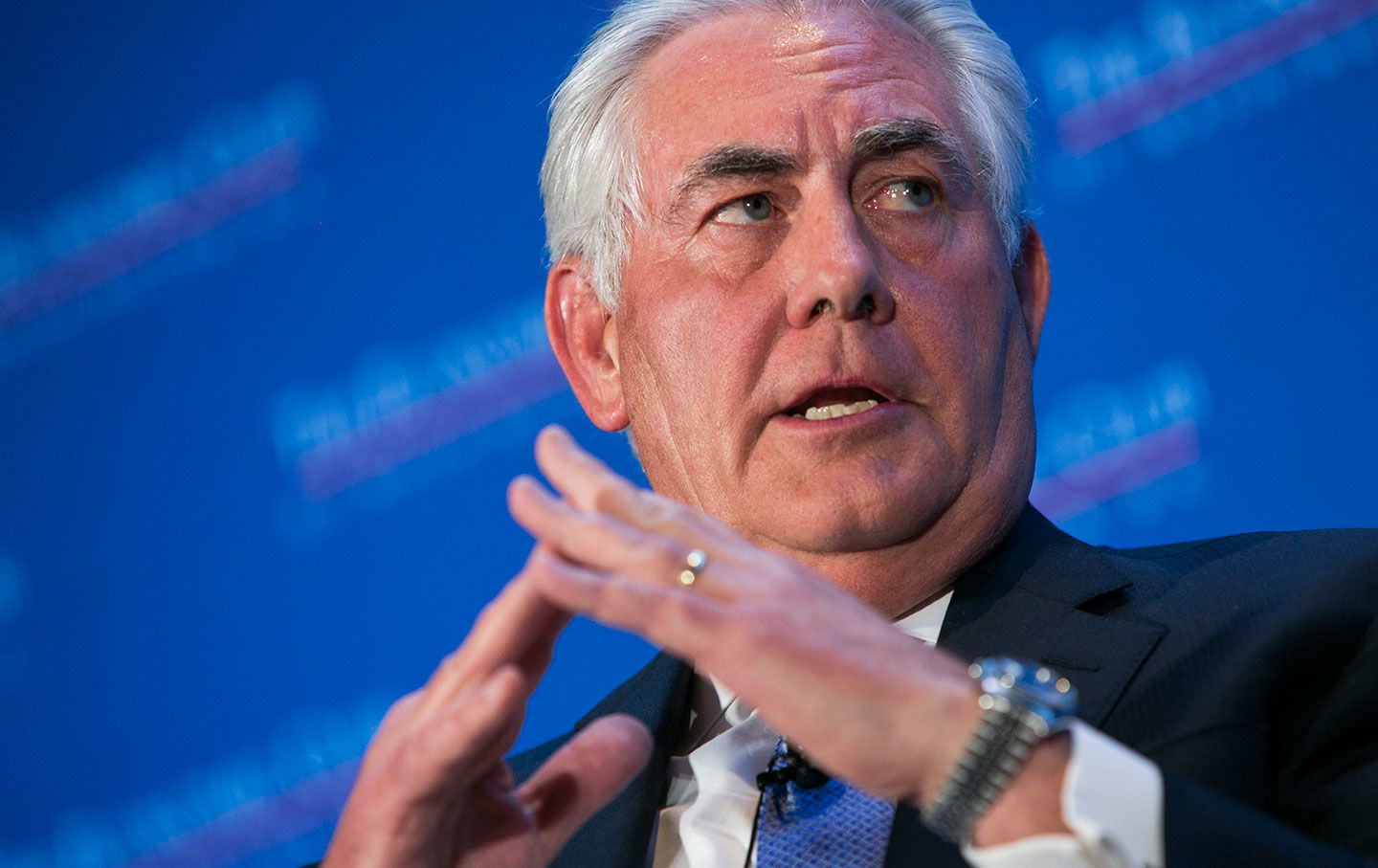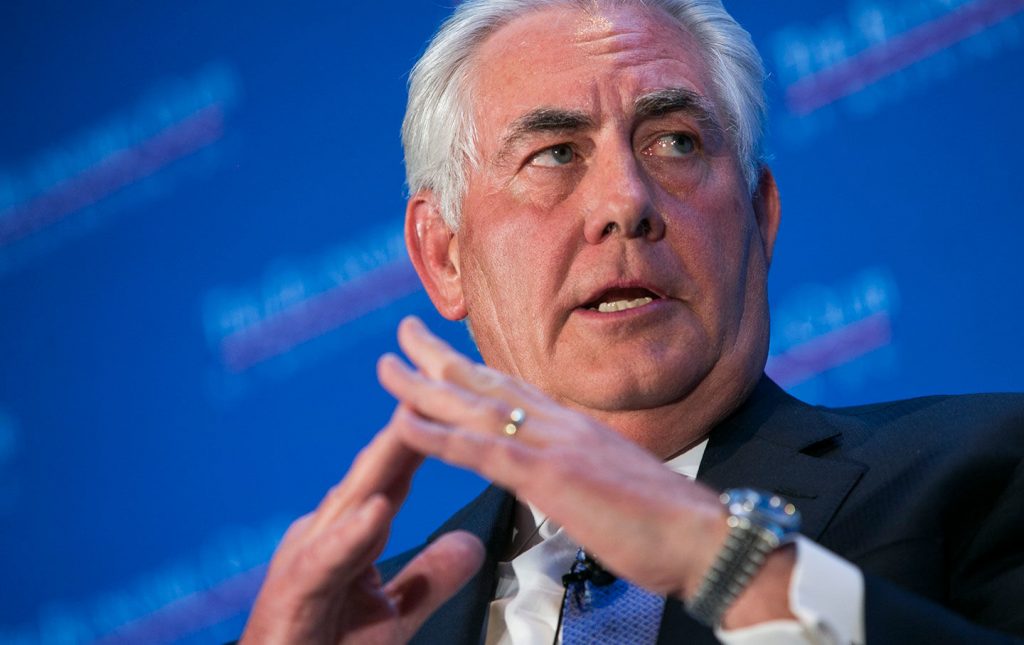Sourced : Washington Post
By Carol Morello and David Filipov
Secretary of State Rex Tillerson arrived in Russia on Tuesday to urge Moscow to back away from the Syrian government and pave the way for the country’s president to transition out of power.
But tough talk on Syria from its closest ally, Russian President Vladimir Putin, made it clear that Tillerson was in for negotiations that would be difficult if not impossible.
Tillerson’s trip, following last week’s U.S. missile strikes on Syria, marks the most direct diplomatic effort by the Trump administration to seek an end to Syria’s civil war.
Russia and Iran back the government of President Bashar al-Assad, while rebel factions supported by the West and its partners have been largely driven back by withering attacks, including the use of a suspected nerve agent on a rebel stronghold that left at least 70 people dead last week.
In Moscow, Putin’s spokesman said it remained unclear whether the Russian leader would meet directly with Tillerson.
“I cannot confirm yet,” Dmitry Peskov told The Washington Post after the private Russian broadcaster RBC reported that they would meet Wednesday.
Before departing Italy — where he met with “like-minded” allies in the Group of Seven major advanced economies and diplomats from largely Muslim nations — Tillerson told reporters that the United States is aiming for a negotiated end to six years of conflict in Syria and wants Russia’s help in ushering Assad out of office.
Claiming that Assad’s rule “is coming to an end,” Tillerson previewed his message to Foreign Minister Sergei Lavrov.
“We hope that the Russian government concludes that they have aligned themselves with an unreliable partner in Bashar al-Assad,” he said.
In what was in effect an ultimatum, he said Moscow must calculate the costs of remaining an ally of Assad, the Iranians and Lebanon’s Shiite militia Hezbollah.
“Is that a long-term alliance that serves Russia’s interests?” he told reporters. “Or would Russia prefer to realign with the United States, with other Western countries and Middle East countries that are seeking to resolve the Syrian crisis?”
In a sign of escalating tensions — even before Tillerson exited his plane in Moscow — Putin told a news conference the Kremlin has “information” that provocateurs are planning to plant chemical substances in suburban Damascus and blame it on Syrian authorities. He gave no further details on the stunning claim.
But he noted that the situation in Syria reminded him of events in Iraq before the U.S. invaded in 2003, an allusion to unfounded assertions of weapons of mass destruction that the George W. Bush administration used to justify the war. He also said Western countries divided over the election of President Trump were scapegoating Russia and Syria.
“We’ve seen all this before,” Putin said.
And the Russian general staff has put the United States on notice, saying that another missile strike would be “unacceptable.” Russia’s Foreign Ministry, meanwhile, said the U.S.-Russian relationship was “in its most difficult period since the Cold War.”
Russia is “concerned about U.S. plans regarding North Korea in the context of a possible scenario of unilateral use of force,” the ministry said, mirroring the alarm expressed by senior Russian officials Monday about the possibility of a U.S. strike against Pyongyang.
The Russian side will also expect Washington to agree to “an impartial investigation into the Idlib chemical incident,” Moscow’s terminology for the chemical weapons attack the United States and its allies have blamed on Assad.
Russia has maintained that last week’s Syrian government airstrike hit a factory where Syrian rebels were manufacturing chemical weapons in the northern Idlib province. After the U.S. missile strikes, Peskov, the Putin spokesman, asserted that the Syrian government “has no chemical arms stockpiles” and said the strike was based on a “far-fetched notion.”
Moscow says it fulfilled its part of a 2013 agreement mandating that Russia oversee the destruction of Assad’s chemical weapons arsenal. On Monday, Russia’s general staff said two locations where chemical weapons might remain are in territory controlled by Syrian rebels.
But Tillerson told reporters that last week’s attack with a suspected nerve agent shows that Moscow did not take its obligations seriously or was incompetent. In either case, he added, the distinction “doesn’t much matter to the dead.”
“We want to relieve the suffering of the Syrian people,” he said, and issued an ultimatum: “Russia can be a part of that future and play an important role. Or Russia can maintain its alliance with this group, which we believe is not going to serve Russia’s interests longer term.”
Tillerson’s visit has the potential to be a window of opportunity, or another marker in the escalation of tensions between the two great superpowers.
On Monday, the Foreign Ministry warned that if Washington does nothing to improve relations, “Moscow will react reciprocally.”
Russia last week suspended a deal that set up a hotline that allowed Russian and U.S.-led coalition air forces to avoid conflict as they conducted separate operations in the crowded airspace over Syria.
The suspension of that agreement does not mean Russian air defense batteries will shoot down incoming missiles in the event of another U.S. strike, but it will not prevent Syria from defending itself, according to Viktor Ozerov, head of the defense and security committee of the upper house of the Russian parliament.
Russia would defend itself, he told the Interfax news agency, to ensure the safety of air bases and supply bases in Tartus wherever a threat originated: by land, air or sea.
Tillerson is uniquely qualified to bring a stern warning to the Russians. As the chief executive of ExxonMobil, he negotiated a deal with the state-controlled gas company Rosneft, leading Putin to bestow the Order of Friendship on him. Tillerson gained a reputation for being willing to walk out on energy deals that did not meet his standards.
However, the Trump administration still has not explained whether it has a clear strategy to ensure Assad’s departure, and what would prompt the United States to take further military action.
And diplomats in Italy did not agree on a British proposal to impose more sanctions on Russia over Syria, on top of sanctions already in place over Ukraine. Italian Foreign Minister Angelino Alfano said ministers want Russia to pressure Assad, but warned, “We must not push Russia into a corner.”
In Turkey, a longtime foe of Assad, the country’s health minister said the authorities had “verified” the use of sarin in the Syrian attack, according to the Anadolu news agency.
The health minister, Recep Akdag, said that blood and urine samples from the victims showed that they had been exposed to isopropyl methyl phosphoric acid, “the metabolite of sarin gas,” the news agency reported.


